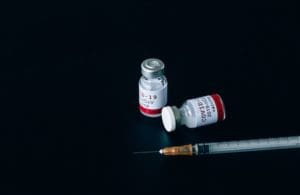
Image from Nataliya Vaitkevich via Pexels
Patients with dermal fillers have a small potential risk of developing facial swelling after obtaining mRNA vaccines.
To date, the FDA has noted the problem in three clinical trial recipients of the COVID-19 vaccine from Moderna (NSDQ:MRNA). The agency hasn’t observed facial swelling in the Phase 3 clinical trial for the COVID-19 vaccine from Pfizer (NYSE:PFE) and BioNTech (NSDQ:BNTX).
We reached out to Dr. Whitney Bowe, a board-certified dermatologist and expert injector, to shed light on the topic.
1. Facial fillers ≠ Botox
Delayed inflammation is possible for patients who receive either hyaluronic acid or non-hyaluronic acid fillers. The former option, comprising brands such as Juvéderm from AbbVie subsidiary Allergan (NYSE:ABBV) and Restylane from Galderma Laboratories, is the most common.
Facial fillers, however, are distinct from Botox and Dysport, the injectable neuromodulators from AbbVie subsidiary Allergan (NYSE:ABBV) and Galderma Laboratories, respectively. “I am not aware of any adverse events related to having Botox injections before or after the COVID vaccine,” said Dr. Whitney Bowe, a board-certified dermatologist and expert injector.
“We know from prior experience with flu vaccines that fillers can very rarely cause transient adverse events, but we haven’t seen those same complications arise with Botox or Dysport injections,” Bowe said. “To be extra cautious, I am advising my patients to wait two weeks between Botox injections and getting the COVID vaccine.”
2. Patients should wait at least two weeks after getting filler to be vaccinated
To minimize risk, patients who have received dermal fillers should wait before obtaining COVID-19 vaccine doses.
“Most of my colleagues are recommending that patients wait two weeks,” Bowe said. “I personally am recommending that my patients space their filler injections at least four weeks apart from their vaccine injections. Again, I take an overly conservative approach when it comes to safety.”
On a related note, patients obtaining filler injections will need to coordinate their dermatologic treatments with COVID-19 vaccine makers’ scheduling recommendations. The Pfizer and Moderna vaccines are both two-dose vaccines.
Pfizer recommends that recipients of the first dose of its BNT162b2 vaccine wait 21 days to receive the second injection. Moderna has specified a 28-day interval between vaccine doses.
3. Delayed facial swelling is not a new phenomenon
The medical community has long known about the potential of rare adverse events following dermal filler injections for dermal-filler patients who have had a viral illness or flu vaccine. “I’m not surprised we are seeing this with the COVID vaccine as well,” Bowe said.
It’s important to remember that such reactions are “very rare” and “short-lived,” Bowe said.
People who have received dermal fillers should not be discouraged from obtaining any vaccine.
In the Moderna Phase 3 trial, three reactions were attributed to dermal fillers out of a pool of 15,184 vaccine recipients. It is not certain how many of the clinical trial volunteers had received prior dermal fillers.
“I also doubt we will see this kind of reaction with Sculptra, which is a filler that doesn’t use hyaluronic acid,” Bowe said, referring to the injectable poly-L-lactic acid from Galderma Laboratories.
4. OTC medications can help manage vaccine-linked facial swelling
In general, patients with such facial swelling will see their symptoms completely resolve in a matter of days of taking antihistamines or oral prednisone. It’s also possible for such symptoms to resolve without any treatment. “These reactions will be rare and when they do occur, the vast majority will resolve very quickly, within a matter of days,” Bowe said.
While patients generally need to be treated on a case-by-case basis, factoring in the degree of swelling and their medical history and current medications, Bowe explained that there is a “likely course of action” for treating such patients. “First line would be to take benadryl around the clock for 24 hours,” she said. “If the swelling persists, you can consider a very short (two-to-three day course) of oral steroids.”
If the swelling persists after that, an enzyme known as hyaluronidase can dissolve the hyaluronic acid filler.
Filed Under: clinical trials, Drug Delivery, Drug Discovery, Infectious Disease





I have various forms of Dystonia. Treated with Botox. I’m concerned because of the areas I get shots. BOTH EYES, BOTH SIDES OF THE JAW, NECK, VOCAL CORDS, SUPRAGLOTTIS and I have a Breathing form. Swelling?????? I also have Trigeminal Nerve on rt side of face. Testified to get shots or not get shots.
Botox is not the same as filler and does not interact negatively with the vaccine. My doctor and numerous articles have confirmed it. Ask your Doctor if you are still concerned, good luck!
Received moderna vaccine feb. 25 experienced chills and fatigue march 15. Now my neck muscles are extremely sensitive painful when I attempt to move my head and sleep is impossible due to discomfort. I’m not sure why I’m a 72 year old male still working and in good health. Any feed back would be appreciated. Thanks
I currently have facial swelling from my dermal fillers and the moderna vaccine. Hope this resolves quickly
Hi Jenny,
How long prior to receiving your vaccine did you have fillers? Has the swelling subsided?
I am considering getting the vaccine and had fillers two weeks ago.
Thank you!
How long should you wait after receiving both Moderna shots before getting fillers.
How long should I wait for Botox after been vaccinated .?
Much facial swelling under eyes and along side of nose. It comes and then gets better for a few days and gets swollen again.